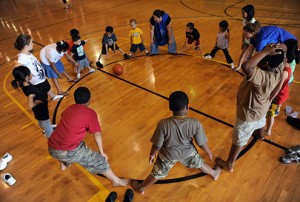 The best way for children to learn is through kinesthetic activities, whether it’s singing and dancing, TPR, or traditional games. It’s an essential part to get and keep their attention in class. After six years of teaching ESL to children, I’ve tried out many different games with a range of ages and group sizes. These are my top 5 fail-proof games for kids’ English classes. I think that you’ll find that they’re engaging for almost every kind of level and type of student and adaptable to most group sizes. Hope it helps out!
The best way for children to learn is through kinesthetic activities, whether it’s singing and dancing, TPR, or traditional games. It’s an essential part to get and keep their attention in class. After six years of teaching ESL to children, I’ve tried out many different games with a range of ages and group sizes. These are my top 5 fail-proof games for kids’ English classes. I think that you’ll find that they’re engaging for almost every kind of level and type of student and adaptable to most group sizes. Hope it helps out!
Find Your Twin
Ahead of time, write the same vocabulary word on two separate sticky notes. Repeat this for as many students as you have in class (write the word on three sticky notes if you have an odd number of students in a class). Then, put a sticky note on the back of each student. Have them walk around and ask yes/no questions to find out which word is written on their sticky note and then find their ‘twin’. The game ends when they have all found their twin (or triplet).
Vocabulary Races

Print off two sets of identical vocabulary flashcards (no more than 10 cards each) and put each set on the floor, on one end of the classroom. On the other end of the classroom, have the children line-up in two lines. The first student of each line will run for the vocabulary word flashcard that the teacher yells out, and the first one to grab the correct flashcard first wins one point for their team. Repeat until all the children have gone at least once.
Go-Fish Crossover
Get blank index cards and have the children write and draw the target vocabulary (four of each vocabulary word) on one side. Once they’re done making the cards, they play go fish, dealing five cards to each student. For example, if the vocabulary is animals, and ‘dolphin’ is one of the terms, student 1 would ask student 2: ‘Do you have a dolphin?’. If student 2 doesn’t have that card, they say ‘go fish!’. Student 1 then picks a card from the middle pile of leftover cards that weren’t dealt. If student 2 does have the card, they must give it to student 1. The student that collects more groups of four cards, wins.
Memory Game

This is an oldie but goodie. Make 2 sets of identical flashcards and arrange them on the floor or table to be a square or rectangle facing down. Each student takes turns turning over two cards. If they match, they keep the pair and go again. If they don’t match, they turn back down the cards and the next student tries to find a match. The student at the end with the most pairs wins.
Vocabulary Basketball
For this activity, you need additional materials but it’s so worth it. The students absolutely love it and will ask you to repeat it again and again. Get a simple, toy basketball hoop with a softball and hang it with sticky tack on the wall. Have the class line up and show the first student in the line a flashcard. If they can say the word, they can shoot the ball and try to make it in. To make it more difficult, you can ask them to make a sentence with the word. To make it easier for younger children, you can give them two or three tries to make it in the hoop. If you want to make it competitive, the child with the most amount of points wins.
Was this article helpful? Share it with the world! Do you have other fail-proof games that you’d like to share with our TEFL teacher community? Leave a comment for us on Instagram or Facebook.
If you’re teaching adults, there are a lot of games you can try out with them, even in a business setting. Check out our blog post on how to choose games for a serious business setting and be sure to tell us if you come out with more tips on how to do it!


Comments are closed.